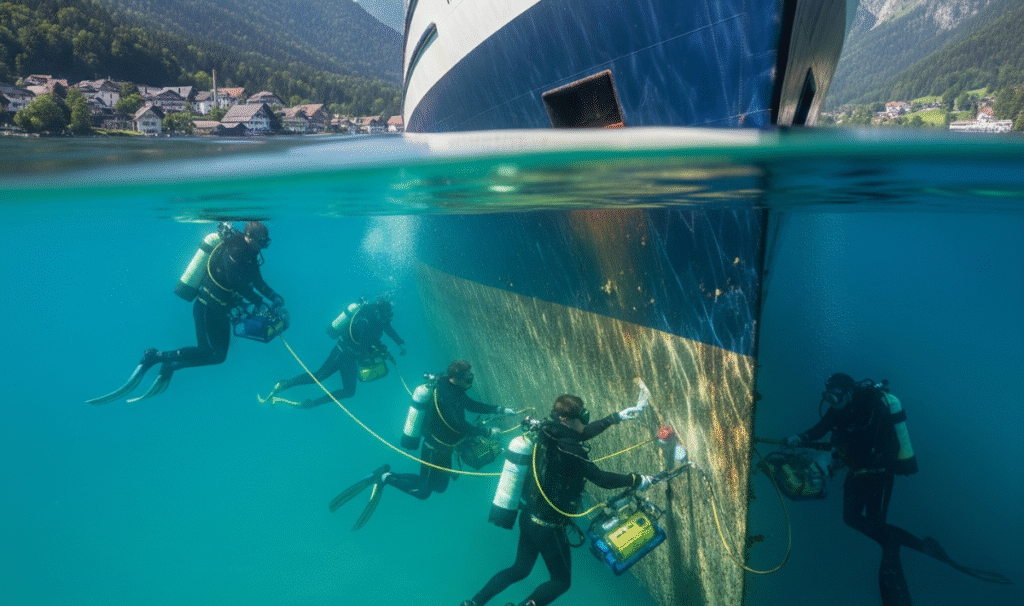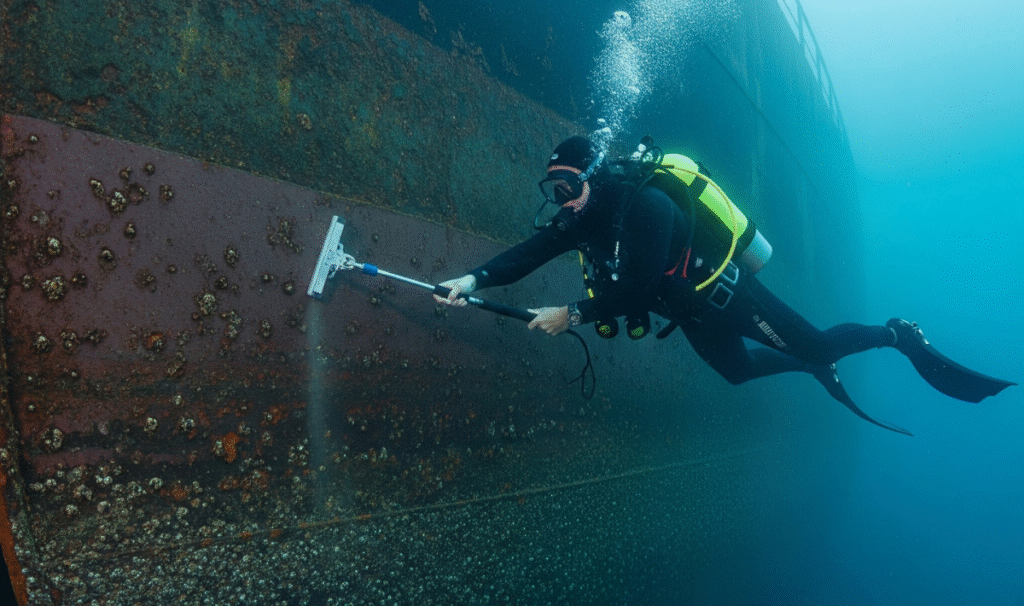When people think of Sri Lanka, they often picture tea plantations, scenic beaches, and ancient history. But beyond these treasures lies another fact: Sri Lanka is one of the most strategically located maritime hubs in the world. Positioned in the Indian Ocean, the island is a vital stop for international shipping routes that connect East and West. And with ships constantly calling at Colombo, Galle, and Hambantota, the upkeep of vessels is inseparable from Sri Lanka’s importance in world trade. One such crucial practice is underwater ship hull cleaning in Sri Lanka, which keeps vessels efficient, compliant, and safe.
Have you ever tried swimming with your clothes on? The drag slows you down, your body gets tired faster, and you burn more energy just to move. Ships face a similar challenge in the ocean. Instead of clothes, though, they carry unwanted passengers like algae, barnacles, mussels, and slime clinging to their hulls. This is called biofouling.
For Sri Lanka, a nation that thrives on its maritime position, ignoring hull cleaning isn’t an option. Every extra knot of fuel wasted or every invasive species brought into its waters affects the nation itself. In this article, we’ll dive into the underwater ship hull cleaning in Sri Lanka and why it is essential for smooth seas and smoother business.
What is Underwater Ship Hull Cleaning in Sri Lanka?
In simple terms, underwater hull cleaning means scrubbing marine growth off a ship’s hull while it remains in water.
- Traditional cleaning: Divers using scrapers and brushes to tackle barnacles.
- Modern cleaning: High-tech robots, hydraulic brushes, and suction devices that not only clean faster but also minimize environmental disturbance.
The International Maritime Organization (IMO.org) and International Marine Contractors Association provide detailed guidelines, ensuring that cleaning practices don’t inadvertently release invasive species or pollutants into the ocean.
Doing this in a strategic maritime hotspot like Sri Lanka improves not just the vessels calling here but the long-term health and safety of its waters.

Boosted Fuel Efficiency and Lower Costs
Let’s start with the most immediate benefit: fuel efficiency. Did you know that just a small amount of marine growth on a ship’s hull can increase fuel consumption by 10–40%? It’s as if the ship is dragging a giant parachute underwater.
In the busy ports of Colombo and Hambantota, where thousands of vessels pass annually, fuel savings are no small matter. For a large container ship, the difference can translate into tens of thousands of dollars per journey.
By ensuring regular underwater ship hull cleaning in Sri Lanka, ship operators enjoy:
- Reduced drag – smoother sailing with less energy needed.
- Lower operational costs – less fuel means more profit.
- Improved scheduling – efficient travel ensures predictable arrivals.
Think of it like keeping a race car tuned—every second and every resource saved counts.
Environmental Advantages and Compliance
Sri Lanka isn’t just a shipping center; it’s also home to sensitive coral reefs, rich marine biodiversity, and thriving fishing communities. Which means ship maintenance directly connects to environmental preservation.
According to the MARPOL Convention, ships must minimize pollution, including emissions and waste. Hull cleaning helps by:
- Reducing emissions: cleaner hulls burn less fuel and release fewer greenhouse gases.
- Preventing invasive species: biofouling organisms stuck on hulls could otherwise travel from the Bay of Bengal to the Arabian Sea, disrupting native ecosystems.
- Complying with regulations: vessels calling at Sri Lankan ports must meet international environmental standards.
By embracing underwater ship hull cleaning in Sri Lanka, ship operators not only respect the law but also help protect the very waters they rely on for trade.
Longer Vessel Life and Safer Operations
Imagine leaving metal exposed to salt and moisture—it rusts. The same applies to ship hulls. Marine growth encourages corrosion and undermines protective paint coatings. Without cleaning, ships face higher repair bills and shorter lifespans.
For vessels docking in Sri Lanka, especially in busy hubs like Colombo, smooth and safe navigation is paramount. Regular underwater ship hull cleaning in Sri Lanka ensures:
- Prolonged hull life – coatings and steel remain intact longer.
- Enhanced maneuverability – fewer obstacles mean safer docking in busy harbors.
- Lower maintenance costs – prevention is always cheaper than repair.
In the end, it’s not just about the hull—it’s about protecting lives, cargo, and ecosystems.
Challenges of Underwater Ship Hull Cleaning in Sri Lanka
Like anywhere, Sri Lanka presents unique challenges to hull cleaning:
- Environmental regulations – cleaning must avoid polluting sensitive waters.
- Weather factors – monsoons and rough seas complicate underwater work.
- Port congestion – Colombo being a transshipment hub, scheduling cleanings can be tricky.
Yet, addressing these challenges makes hull cleaning more important than ever.
Technological Innovations in Hull Cleaning
Advanced technology boosts efficiency while reducing risks:
- Robotic cleaners – magnetic crawlers with cameras provide thorough, safe cleaning.
- Eco-friendly suction systems – capture debris to prevent local water pollution.
- Special antifouling paints – reduce fouling buildup between cleanings.
Ports and maritime organizations, like iaphworldports.org, highlight these new practices as essential for meeting modern sustainability targets. Sri Lanka, given its global shipping relevance, is gradually embracing these innovations.
Choosing the Right Service Provider in Sri Lanka
If you’re a ship operator considering underwater ship hull cleaning in Sri Lanka, here’s what to check before hiring:
- Certifications – ensure they comply with IMO and IMCA guidelines.
- Methodology – ask about how they handle collected debris.
- Technology – robots and advanced tools usually mean better results.
- Local expertise – knowledge of Sri Lankan waters and regulations is a must.
By being thorough in selection, you ensure that both your vessel and Sri Lanka’s marine environment are safe.

Recap of the 3 Benefits
To recap, here are the 3 key benefits of underwater ship hull cleaning in Sri Lanka:
- Improved fuel efficiency and cost savings – lower drag equals big money saved.
- Environmental preservation and compliance – lower emissions, international law adherence, and biodiversity protection.
- Vessel durability and safety – cleaner hulls last longer, move more safely, and cut maintenance costs.
Conclusion
Sri Lanka stands as one of Asia’s most important maritime gateways, and what happens beneath the waterline directly affects its significance. By investing in underwater ship hull cleaning in Sri Lanka, ship operators ensure their vessels are faster, cheaper to run, environmentally responsible, and safer at sea.
Think of it as sharpening the hidden blade of your vessel—unseen, but vital for success. With trusted experts like CleanShip.co, shipowners can safeguard efficiency, compliance, and sustainability. Beneath the waves, a clean hull means a smooth journey ahead.
FAQ:
Q1: How often should ships undergo hull cleaning in Sri Lanka?
Most vessels require cleaning every 6–12 months, depending on routes and fouling severity in tropical waters.
Q2: Can underwater cleaning harm Sri Lanka’s marine ecosystems?
If not managed properly, yes. But when done with IMO and IMCA-approved methods, the risks are reduced greatly.
Q3: Does hull cleaning actually lower costs significantly?
Yes, fuel savings from reduced drag can total millions annually for large vessels.
Q4: How does this help local ecosystems like Sri Lanka’s reefs?
By preventing invasive species transfer and reducing emissions, hull cleaning indirectly protects local biodiversity.
Q5: What technologies are used in hull cleaning today?
Robotic crawlers, eco-suction systems, and antifouling coatings are leading innovations.


